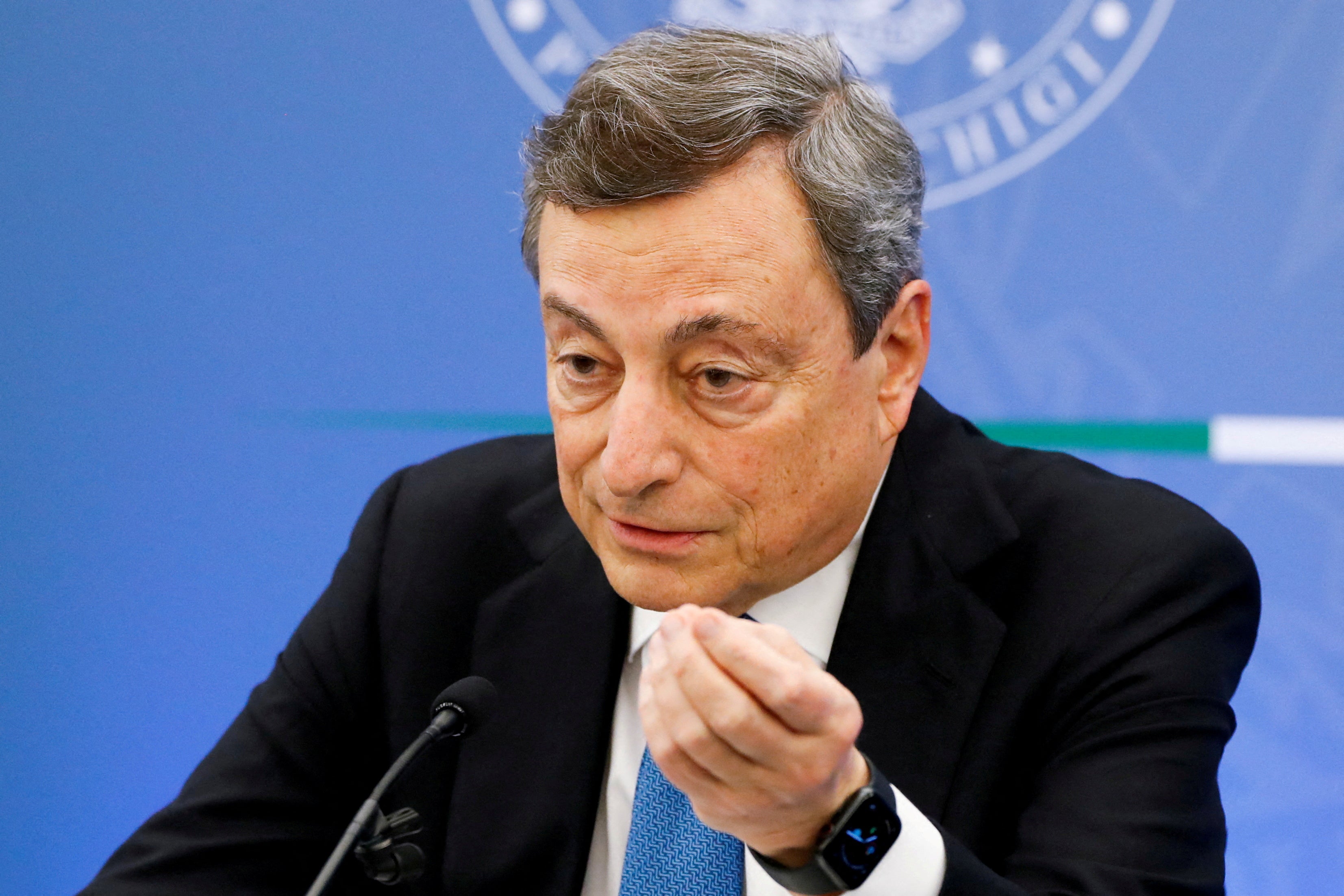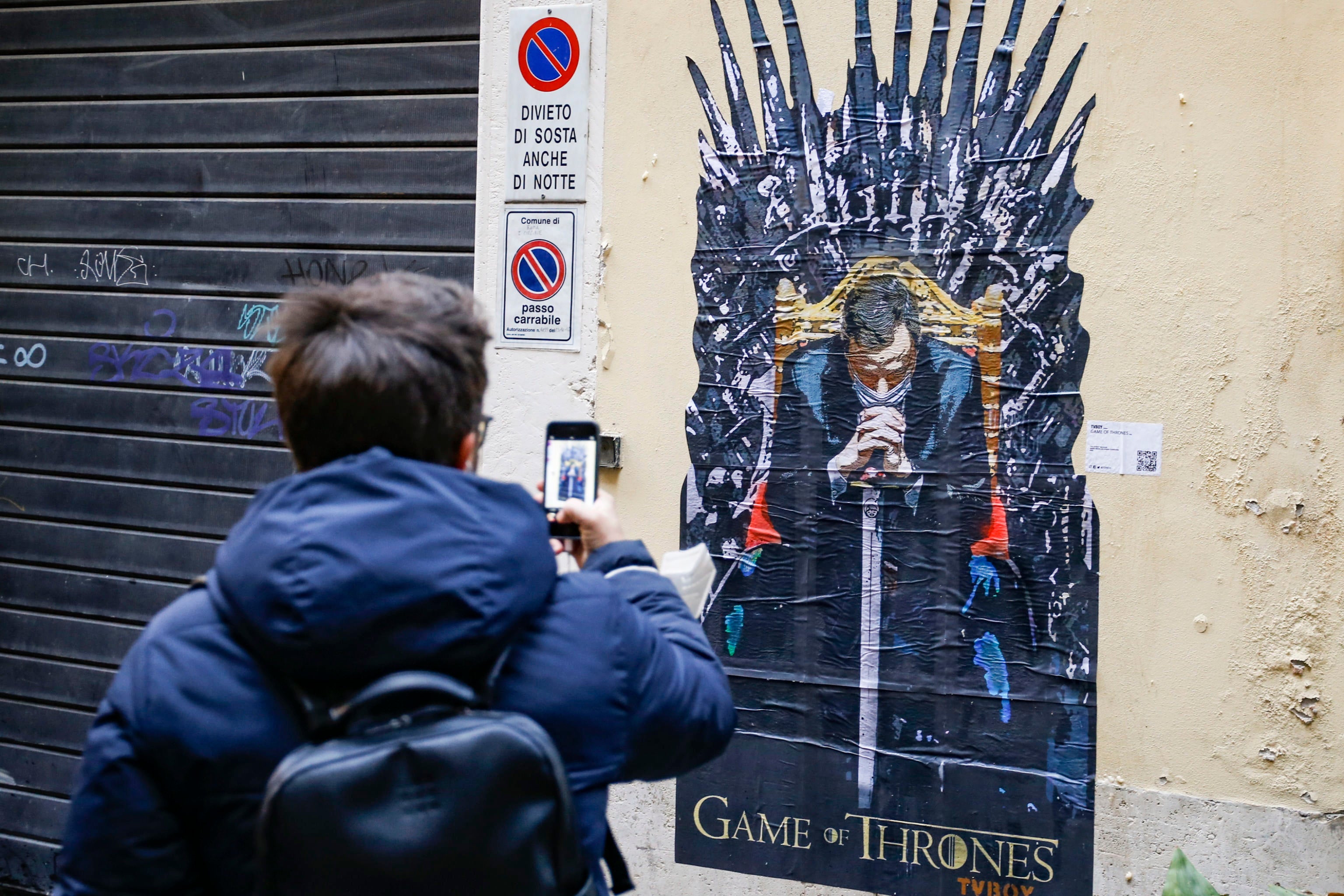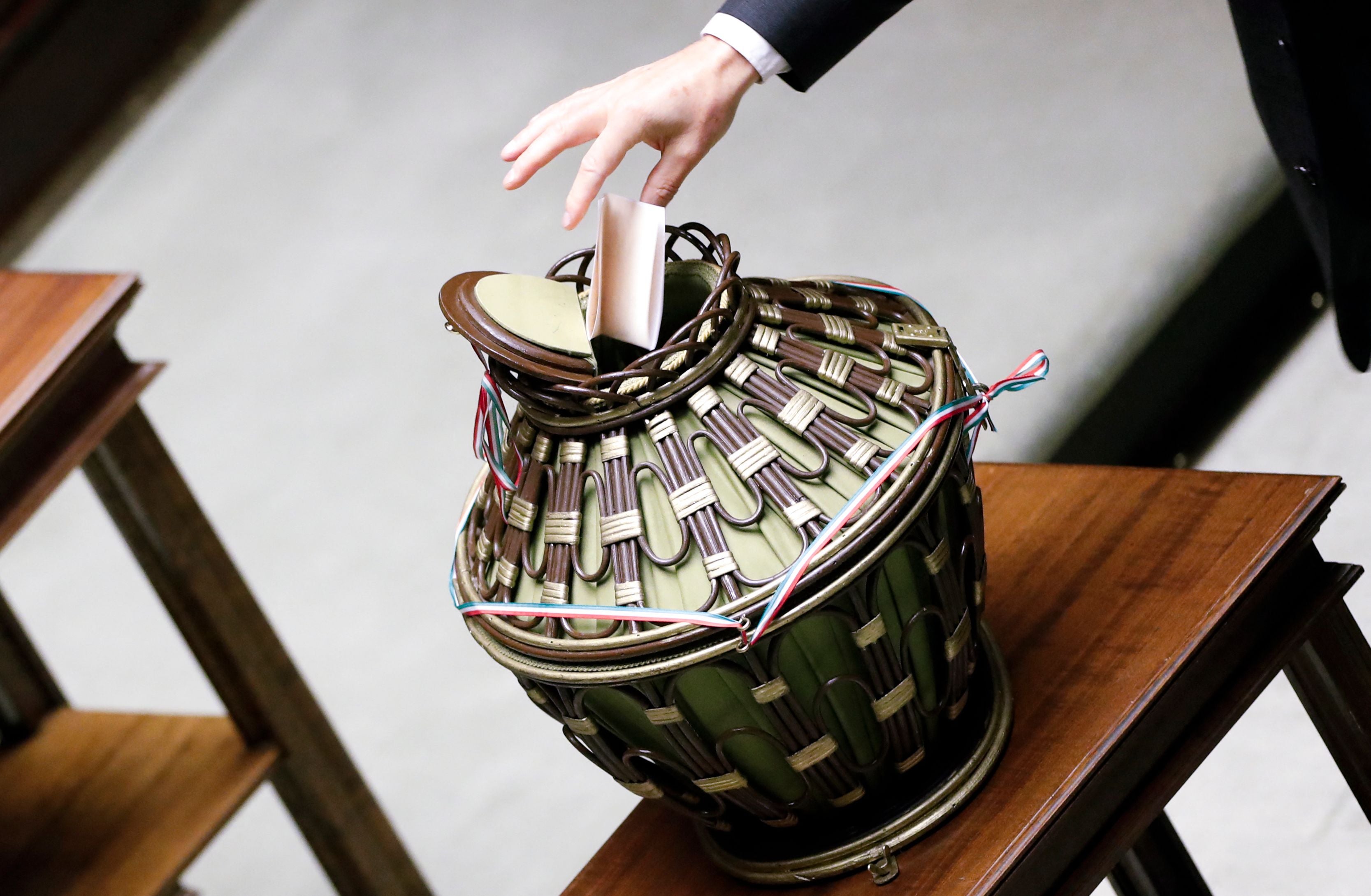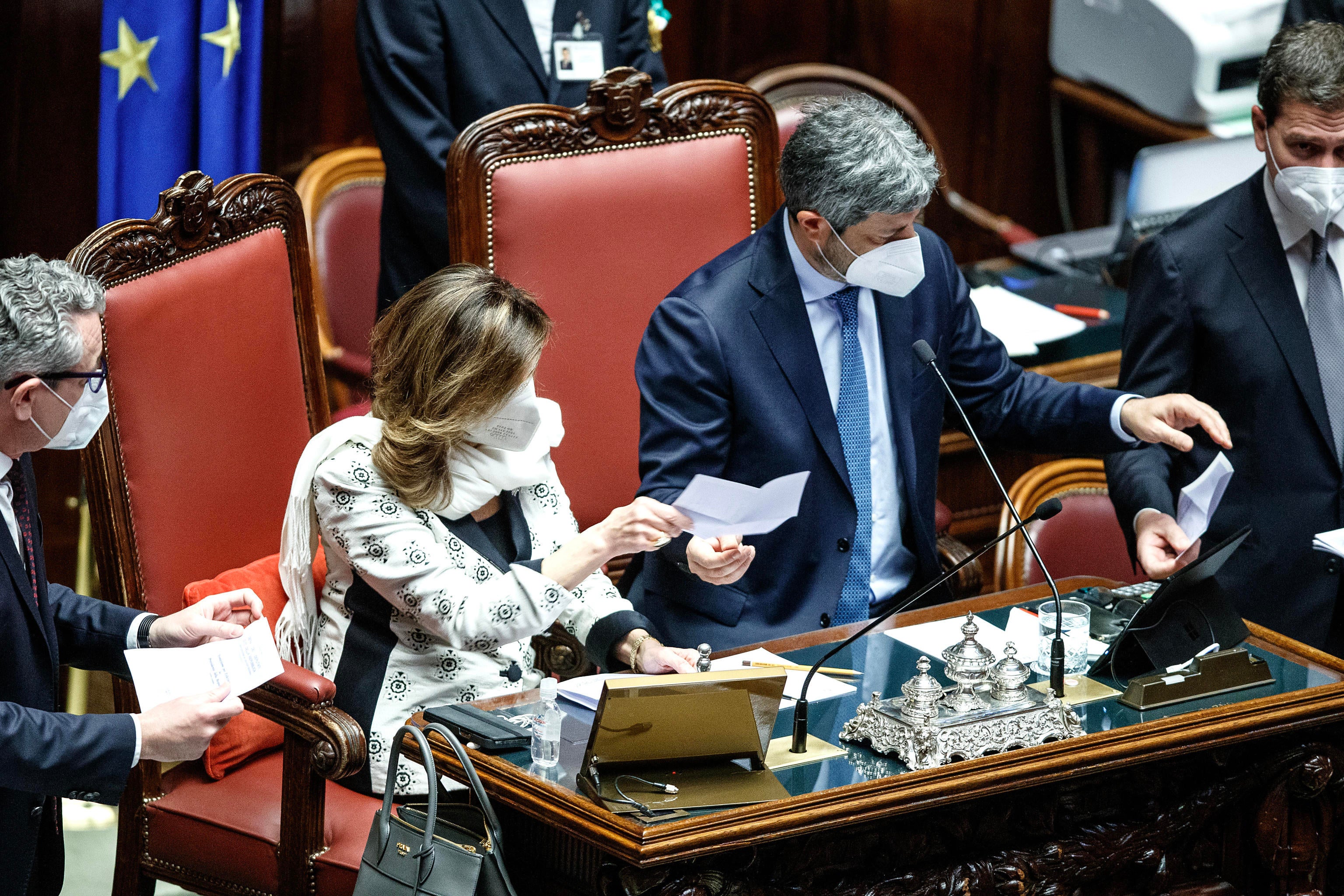‘Anyone but Draghi’ - how an Italian presidential bid fell flat
Italy’s PM Mario Draghi lost out as President Sergio Mattarella was re-elected

Your support helps us to tell the story
From reproductive rights to climate change to Big Tech, The Independent is on the ground when the story is developing. Whether it's investigating the financials of Elon Musk's pro-Trump PAC or producing our latest documentary, 'The A Word', which shines a light on the American women fighting for reproductive rights, we know how important it is to parse out the facts from the messaging.
At such a critical moment in US history, we need reporters on the ground. Your donation allows us to keep sending journalists to speak to both sides of the story.
The Independent is trusted by Americans across the entire political spectrum. And unlike many other quality news outlets, we choose not to lock Americans out of our reporting and analysis with paywalls. We believe quality journalism should be available to everyone, paid for by those who can afford it.
Your support makes all the difference.Last weekend, for perhaps the first time in his gilded career, Mario Draghi missed out on a promotion.
The Italian prime minister was the bookmakers’ hot favourite to become the country’s latest president. He himself made clear he wanted the prestigious post, with its seven-year term and considerable political clout.
But over a week of repeated ballots, the 74-year-old premier never got more than five votes from the 1,009 parliamentarians and regional delegates who took part in the election.
Claudio Borghi, a deputy from the rightist League party, was involved in the fraught negotiations to elect a new head of state, trying to persuade undecided lawmakers to back a candidate from his own conservative camp.
“Some said no, some said they would think about it, but the message I got from most of them was that they would consider voting for anyone but Mr Draghi,” Mr Borghi said.
So what went wrong for the former European Central Bank chief who rode to Italy’s rescue a year ago, coming out of retirement to become prime minister after one of Rome’s frequent government collapses?
Interviews with more than a dozen Italian parliamentarians reveal Mr Draghi’s bid faced high hurdles from the start, though these were largely overlooked by many commentators who viewed him as a virtual shoo-in for the coveted presidential role.
Foremost among these obstacles was the fact that if Mr Draghi changed jobs, his government would have automatically fallen, potentially triggering elections a year ahead of schedule which most lawmakers, fearful of losing their seats and pension rights, were anxious to avoid.
Yet this was not the only problem. The vote saw tactical missteps by Mr Draghi and showed his unpopularity among rank-and-file politicians, many of whom feel he has cut them out of the decision-making process and ridden roughshod over parliament.
Mr Draghi’s sometimes high-handed manner has also won him enemies in the cabinet, well-placed government sources say, meaning only a few members of his coalition team tried to fight his corner as the vote progressed.

Reuters conversations with more than a dozen politicians of all stripes suggest Mr Draghi is respected, but little loved.
The prime minister’s office declined to comment on why Mr Draghi had not won election.
Unaffiliated deputy Riccardo Magi said parliamentarians were terrified of snap elections. The prospect of Mr Draghi switching roles was “a leap in the dark” they were not prepared to take.
Fausto Raciti, a deputy with the centre-left Democratic Party (PD), said his party feared an election would yield victory for Giorgia Meloni’s hard-right Brothers of Italy party, which is riding high in the polls.
“There was the mathematical certainty of early elections and Meloni premier. Nobody in the PD was willing to run that risk,” Mr Raciti said.
In the eight rounds of balloting which eventually crowned outgoing President Sergio Mattarella for a second term, Mr Draghi mustered between two and five votes, underscoring his failure to build strong ties within the two houses of parliament.

Former education minister Lorenzo Fioramonti and Mr Borghi both described Mr Draghi’s bid as “naive”, saying he had underestimated the task at hand.
“If you want to be the ECB chief you have to negotiate with five or 10 people. To be president of the republic you have to convince 1,000 lawmakers. It’s a different skill,” Mr Borghi said.
Mr Draghi, who carries rare clout on the international stage, has a reputation in government circles of being aloof. While he consults widely, he takes decisions alone, leaving some senior figures feeling cut out of the command chain.
The idea of letting such a powerful figure take charge of the presidential palace for the next seven years also served as a deterrent in a country where consensus politics predominates.
“In Italian history, the country’s strongest politician has never been elected president because the system of checks and balances has its own logic,” said Ettore Rosato, a leading light in the centrist Italia Viva party.
Mr Draghi made his presidential ambitions clear on 22 December when he told reporters his government had largely completed its agenda. “The work can continue regardless of who is there,” he said.

Probably his primary task when he took on the premiership was to manage Italy’s coronavirus response, so his suggestion his work was done, just as a fourth wave of Covid-19 was accelerating fast, seemed to many to be inappropriate.
“This ambition was a bit destabilising,” said former prime minister Mario Monti, renowned for his diplomatic language.
“(It was) not the natural attitude of a prime minister far from the end of his mandate and with tough tasks to complete,” Mr Monti told La7 TV on Sunday. Mr Draghi’s office declined to comment on Mr Monti’s remarks.
Mr Draghi’s move had also offended some lawmakers because it broke with etiquette by which no-one is supposed to seek the presidency, but only accept it as an honour thrust upon them.
The disapproval grew when, almost as soon as voting started, Mr Draghi reportedly began talks with party chiefs in what was widely seen as an attempt to secure their support.
“The December news conference was bad enough, but then receiving party leaders while we were voting for the president of the republic seemed to us in parliament like a rupture of the rules,” said Sandro Ruotolo, senator with a small leftist group.
These talks were confirmed to Reuters by two sources and were widely reported in Italy’s main newspapers. Mr Draghi’s office declined to comment.
In the event, the leader of only one major coalition party, the PD’s Enrico Letta, cautiously backed Mr Draghi, while the three other main government groups - the League, Forza Italia and 5-Star Movement - all publicly disavowed his candidacy.
“Mr Draghi didn’t make it in the end because the leaders knew they couldn’t control their own lawmakers and didn’t want to take a chance,” said former minister Mr Fioramonti, now a deputy with an ecologist group.
Reuters



Join our commenting forum
Join thought-provoking conversations, follow other Independent readers and see their replies
Comments